Mitigating Risk Factors for Children of International Educators and Humanitarian Workers
Tanya crossman and Lauren mccall
When TCK Training released our white paper, Caution and Hope: The Prevalence of Adverse Childhood Experiences in Globally Mobile Third Culture Kids, we were only beginning to scratch the surface of the data we collected from 1,904 individuals who completed our 2021 survey on childhood trauma in globally mobile Third Culture Kids. In our second white paper, TCKs at Risk: Risk Factors and Risk Mitigation for Globally Mobile Families, we looked at 12 risk factors and ways to mitigate these risks. This article is part of a series of blog posts that looks a little deeper at certain sub-groups represented in the data.
Mitigating Risk Factors for Children of International Educators and Humanitarian Workers
In the course of our research into Adverse Childhood Experiences among globally mobile young people, we learned a lot of difficult truths about what the children of international educators and humanitarian workers experienced. This blog post will discuss the prevalence of various types of abuse and neglect, but no graphic descriptions.
In our 2021 survey, both the education and humanitarian sectors had less than 100 respondents; therefore the two sectors were combined into a single data set, creating a sub-group of 150 people, in order to maintain statistical quality (source: Caution and Hope for Children of International Educators and Humanitarian Workers). In our white papers, we abbreviated this combined group as “Edu-NGO” (the largest sector within the humanitarian group were NGO workers) and this is the term we will use throughout the rest of this blog post.
According to our research, TCKs who grew up in education and NGO families were four times more likely than Americans to experience emotional abuse. Our survey also found that 2 out of every 5 Edu-NGO TCKs reported feeling neglected and 44% born after 1980 reported an adult with mental illness in their childhood home.
In our 2021 survey, both the education and humanitarian sectors had less than 100 respondents; therefore the two sectors were combined into a single data set, creating a sub-group of 150 people, in order to maintain statistical quality (source: Caution and Hope for Children of International Educators and Humanitarian Workers). In our white papers, we abbreviated this combined group as “Edu-NGO” (the largest sector within the humanitarian group were NGO workers) and this is the term we will use throughout the rest of this blog post.
According to our research, TCKs who grew up in education and NGO families were four times more likely than Americans to experience emotional abuse. Our survey also found that 2 out of every 5 Edu-NGO TCKs reported feeling neglected and 44% born after 1980 reported an adult with mental illness in their childhood home.
Internationally mobile families and children are often viewed as privileged, and therefore not at risk of ACEs, PTSD, or other mental health struggles. This data suggests the opposite.
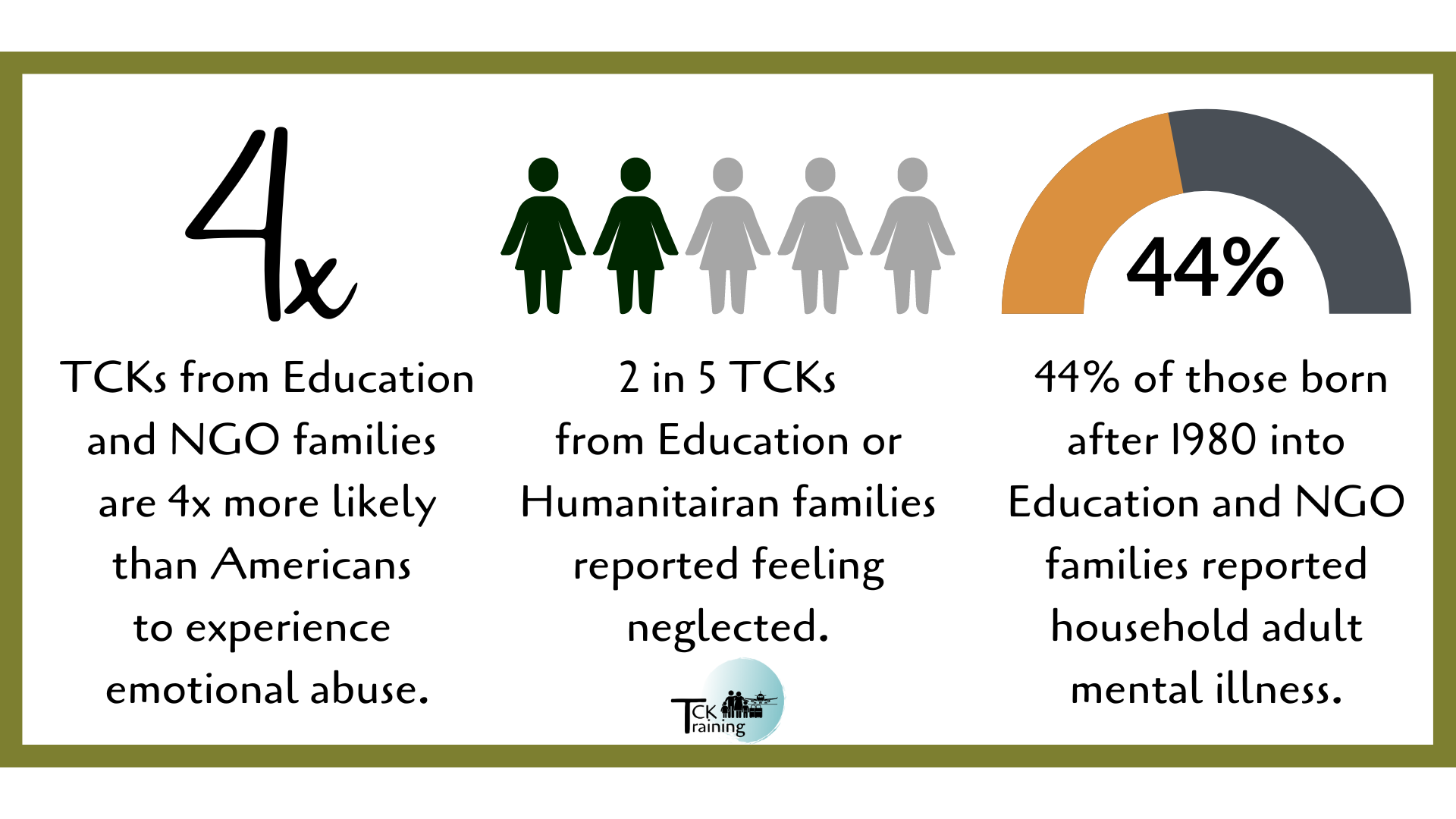
Adverse Childhood Experiences (ACEs)
Research into ACEs has taken place worldwide across 25 years. The ten ACE factors are divided into Child Maltreatment (abuse and neglect directly suffered as a child) and Household Dysfunction (factors affecting the childhood living environment). The ACE questionnaire asks about childhood experiences without using the words "abuse" or "neglect" - helpful for catching abusive or neglectful experiences a person would not label that way themselves. We often compare our results to the CDC-Kaiser study of 17,000 Americans, as this is the largest ACE study done worldwide to date. Comparisons with other global populations can be found in our white paper.
We saw consistently different results across categories among TCKs born before/after 1980 – with the Boomer/Gen X generations on one side, and the Millennial/Gen Z generations on the other. This also delineates the groups who were/were not impacted by the internet during childhood.
Our research found that nearly 1 in 5 Edu-NGO kids was at high risk for adverse outcomes in adulthood (source: Caution and Hope for Children of International Educators and Humanitarian Workers).
Abuse
Abuse is broken down into three categories: physical, emotional and sexual. Physical abuse was reported by 15% of Edu-NGO TCKs in our survey, nearly half the rate among Americans in the CDC-Kaiser study. Emotional abuse, however, was reported by 44% of Edu-NGO TCKs, 4 times the rate of Americans surveyed.
Sexual abuse among Edu-NGO TCKs in our survey is an even more difficult story. Overall, nearly 1 out of every 3 Edu-NGO TCKs reported sexual abuse, 1.5 times the rate of Americans surveyed. Nearly half of Edu-NGO TCKs born before 1980 reported childhood sexual abuse, twice the rate reported by their younger peers.
We saw consistently different results across categories among TCKs born before/after 1980 – with the Boomer/Gen X generations on one side, and the Millennial/Gen Z generations on the other. This also delineates the groups who were/were not impacted by the internet during childhood.
Our research found that nearly 1 in 5 Edu-NGO kids was at high risk for adverse outcomes in adulthood (source: Caution and Hope for Children of International Educators and Humanitarian Workers).
Abuse
Abuse is broken down into three categories: physical, emotional and sexual. Physical abuse was reported by 15% of Edu-NGO TCKs in our survey, nearly half the rate among Americans in the CDC-Kaiser study. Emotional abuse, however, was reported by 44% of Edu-NGO TCKs, 4 times the rate of Americans surveyed.
Sexual abuse among Edu-NGO TCKs in our survey is an even more difficult story. Overall, nearly 1 out of every 3 Edu-NGO TCKs reported sexual abuse, 1.5 times the rate of Americans surveyed. Nearly half of Edu-NGO TCKs born before 1980 reported childhood sexual abuse, twice the rate reported by their younger peers.
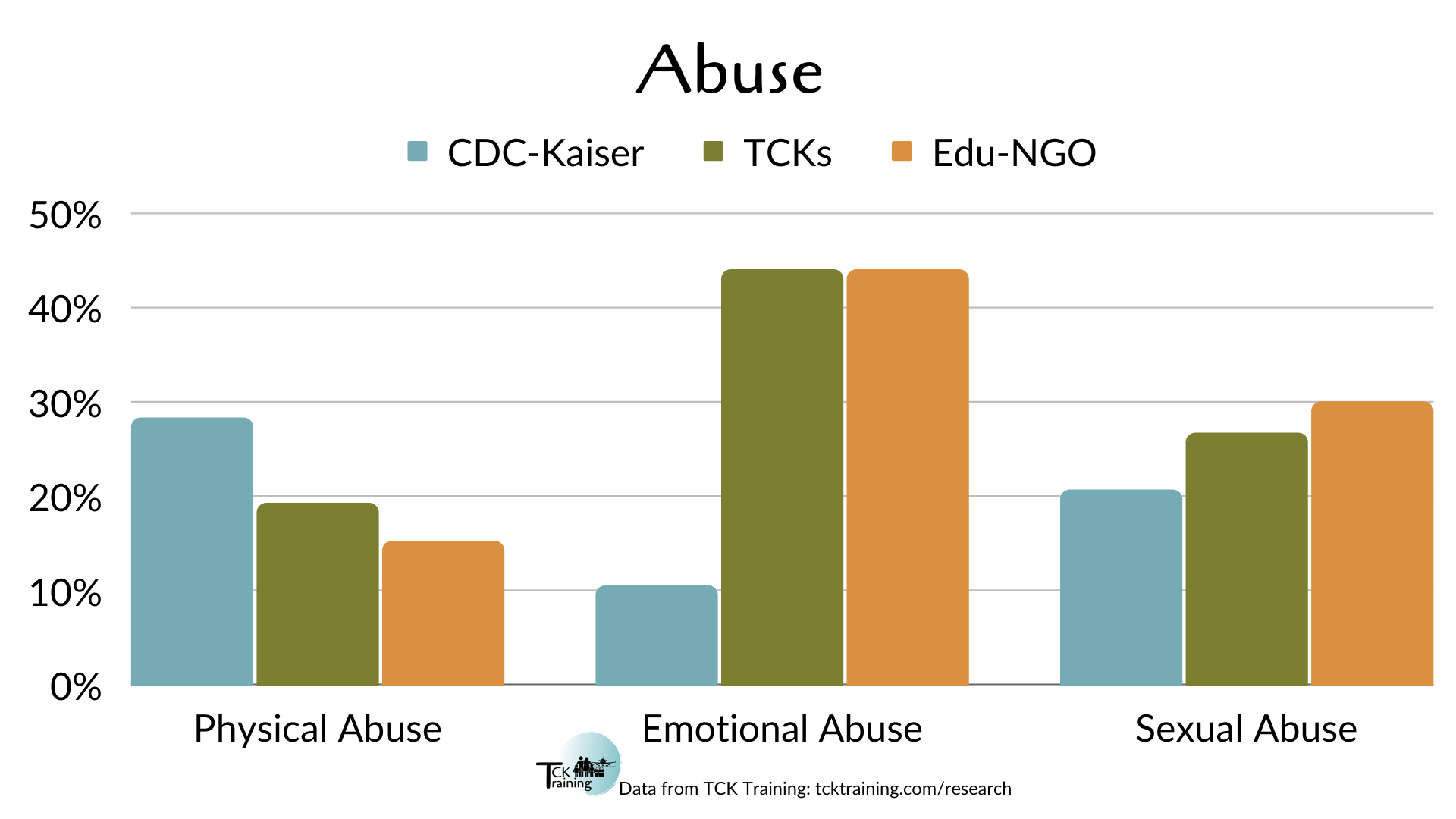
While neither grooming nor child-to-child sexual abuse was included in the original ACE study, we included both of these extra factors in our research. Grooming is defined as ways that predators prepare children for potential future abuse, including through encouraging secrecy from parents or guardians regarding special treatment shown to the child. It is important to note that not every groomed child is abused, nor is every abused child groomed. Nearly half of Edu-NGO TCKs born before 1980 reported being groomed. While younger Edu-NGO TCKs were 1.5 times less likely to report grooming than previous generations, the Edu-NGO sector remained most likely to report grooming at any age.
Another issue not addressed by the ACE questionnaire is that of grooming. These are ways that predators prepare children for potential future abuse.
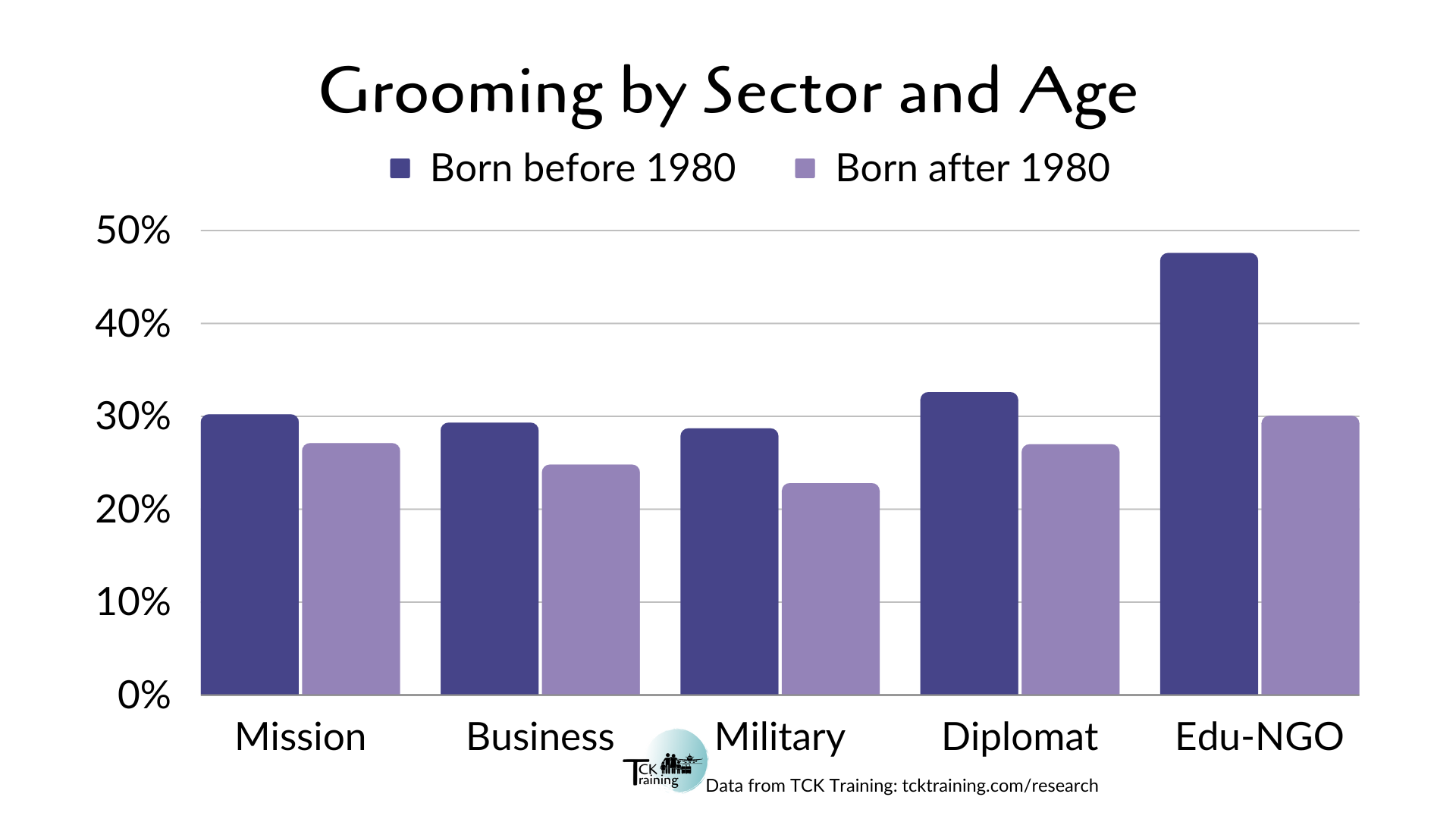
Child-to-child sexual abuse was included because of the lasting effects it can have on survivors. Child-to-child sexual abuse is linked with higher rates of emotional abuse (65%), adult-to-child sexual abuse (44%), and emotional neglect (54%). Overall, one quarter of Edu-NGO TCKs reported child-to-child sexual abuse. Boomer and Gen X generations carry the weight of this, with one third reporting child-to-child sexual abuse, again nearly 1.5 times higher than younger Edu-NGO TCKs.
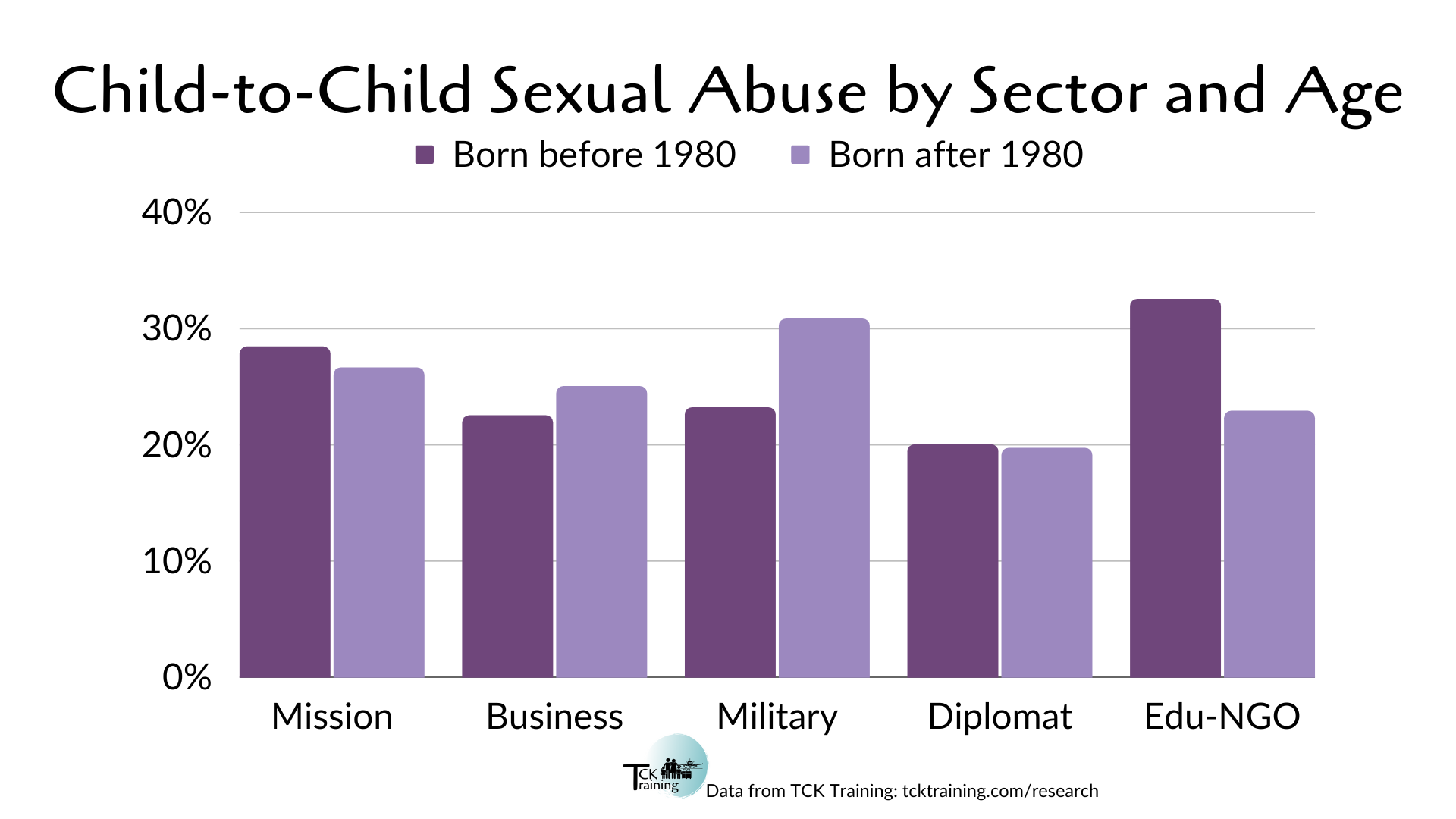
Neglect
Neglect is defined through the lens of perception, where a child feels/worries their emotional/physical needs will not be met. While physical neglect is often seen as an extension of poverty, in the ACE context it is not just about what the child has access to but also about their security that provision will continue in the future. In cases of physical neglect, a child feels their physical needs may not be met – even if they are always fed and cared for. This can look like worry that they will not have enough food, shelter, clean clothing, protection, or medical care. In the case of emotional neglect, a child feels unloved or unimportant – whether or not their parents actually do love them.
9% of Edu-NGO TCKs reported physical neglect, about the same as TCKs overall at 11% and Americans at 10%. Those born before 1980 were twice as likely to report physical neglect than those in younger generations (13% vs. 7%). 43% of Edu-NGO TCKs reported emotional neglect, over 4 times the rate found among Americans (11%).
Neglect is defined through the lens of perception, where a child feels/worries their emotional/physical needs will not be met. While physical neglect is often seen as an extension of poverty, in the ACE context it is not just about what the child has access to but also about their security that provision will continue in the future. In cases of physical neglect, a child feels their physical needs may not be met – even if they are always fed and cared for. This can look like worry that they will not have enough food, shelter, clean clothing, protection, or medical care. In the case of emotional neglect, a child feels unloved or unimportant – whether or not their parents actually do love them.
9% of Edu-NGO TCKs reported physical neglect, about the same as TCKs overall at 11% and Americans at 10%. Those born before 1980 were twice as likely to report physical neglect than those in younger generations (13% vs. 7%). 43% of Edu-NGO TCKs reported emotional neglect, over 4 times the rate found among Americans (11%).
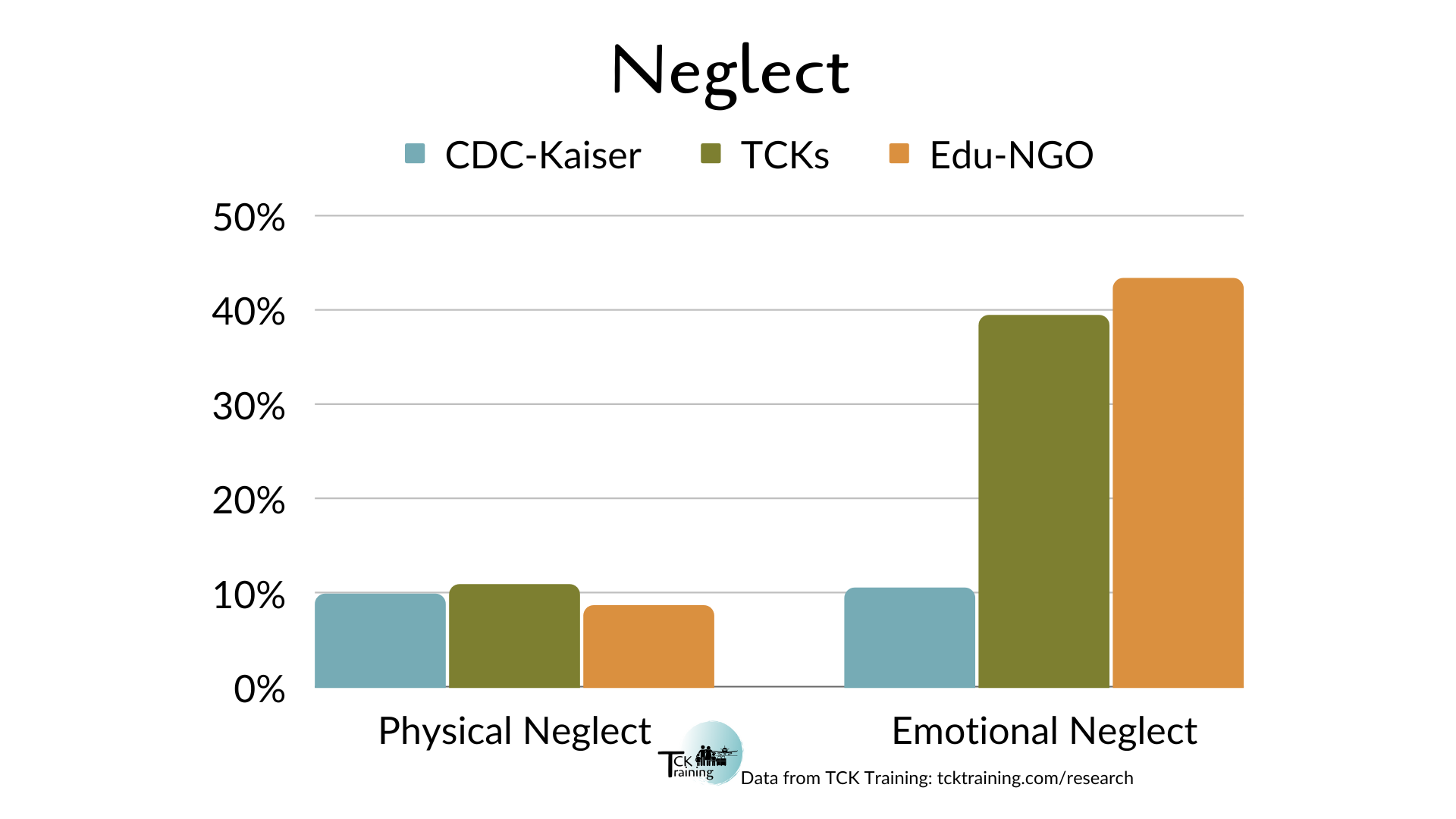
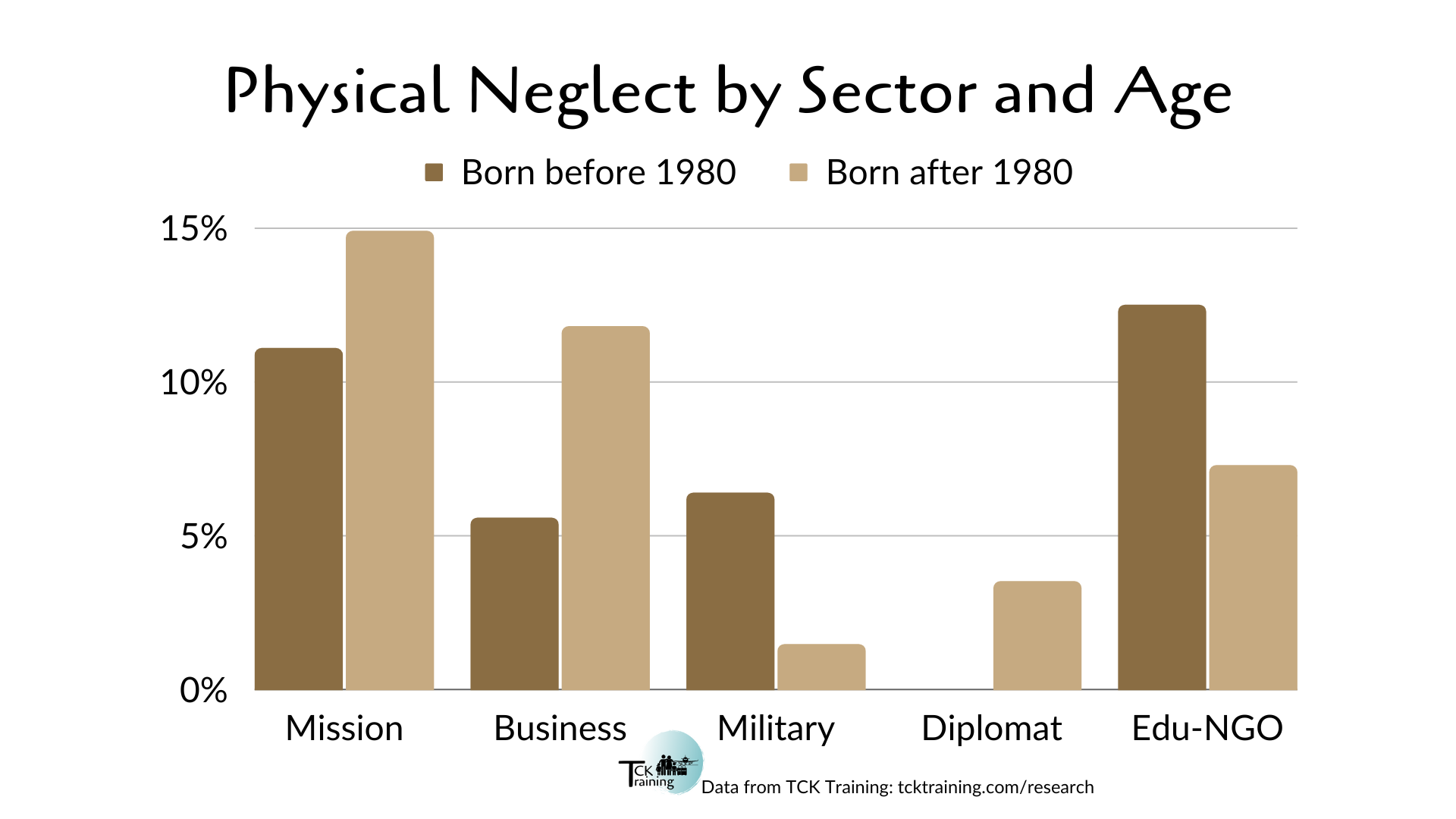
Household Dysfunction
Household dysfunction encompasses household adult mental illness, parental violence, parental divorce or separation, household adult incarceration, and household adult substance abuse. Incarceration was so low among TCKs that we have not included it in this summary.
Household Adult Mental Illness
Household adult mental illness is an ACE assigned to anyone who had an adult living in their home during childhood who was depressed, mentally ill, or attempted suicide. 39% of TCKs overall and 42%-44% of TCKs born after 1980 (depending on their sector) reported household adult mental illness. Edu-NGO TCKs in our survey reported an average rate of household adult mental illness (39%); however, looking at the breakdown of generations we see a significant difference. Edu-NGO TCKs born after 1980 reported household adult mental illness at a rate of over 1.5 times higher than those in previous generations (44% vs. 25%).
The high rates of adult mental illness among TCKs in comparison to Americans demonstrates that many expatriate families are under stress, especially those who move abroad for work, and they need support.
Household dysfunction encompasses household adult mental illness, parental violence, parental divorce or separation, household adult incarceration, and household adult substance abuse. Incarceration was so low among TCKs that we have not included it in this summary.
Household Adult Mental Illness
Household adult mental illness is an ACE assigned to anyone who had an adult living in their home during childhood who was depressed, mentally ill, or attempted suicide. 39% of TCKs overall and 42%-44% of TCKs born after 1980 (depending on their sector) reported household adult mental illness. Edu-NGO TCKs in our survey reported an average rate of household adult mental illness (39%); however, looking at the breakdown of generations we see a significant difference. Edu-NGO TCKs born after 1980 reported household adult mental illness at a rate of over 1.5 times higher than those in previous generations (44% vs. 25%).
The high rates of adult mental illness among TCKs in comparison to Americans demonstrates that many expatriate families are under stress, especially those who move abroad for work, and they need support.
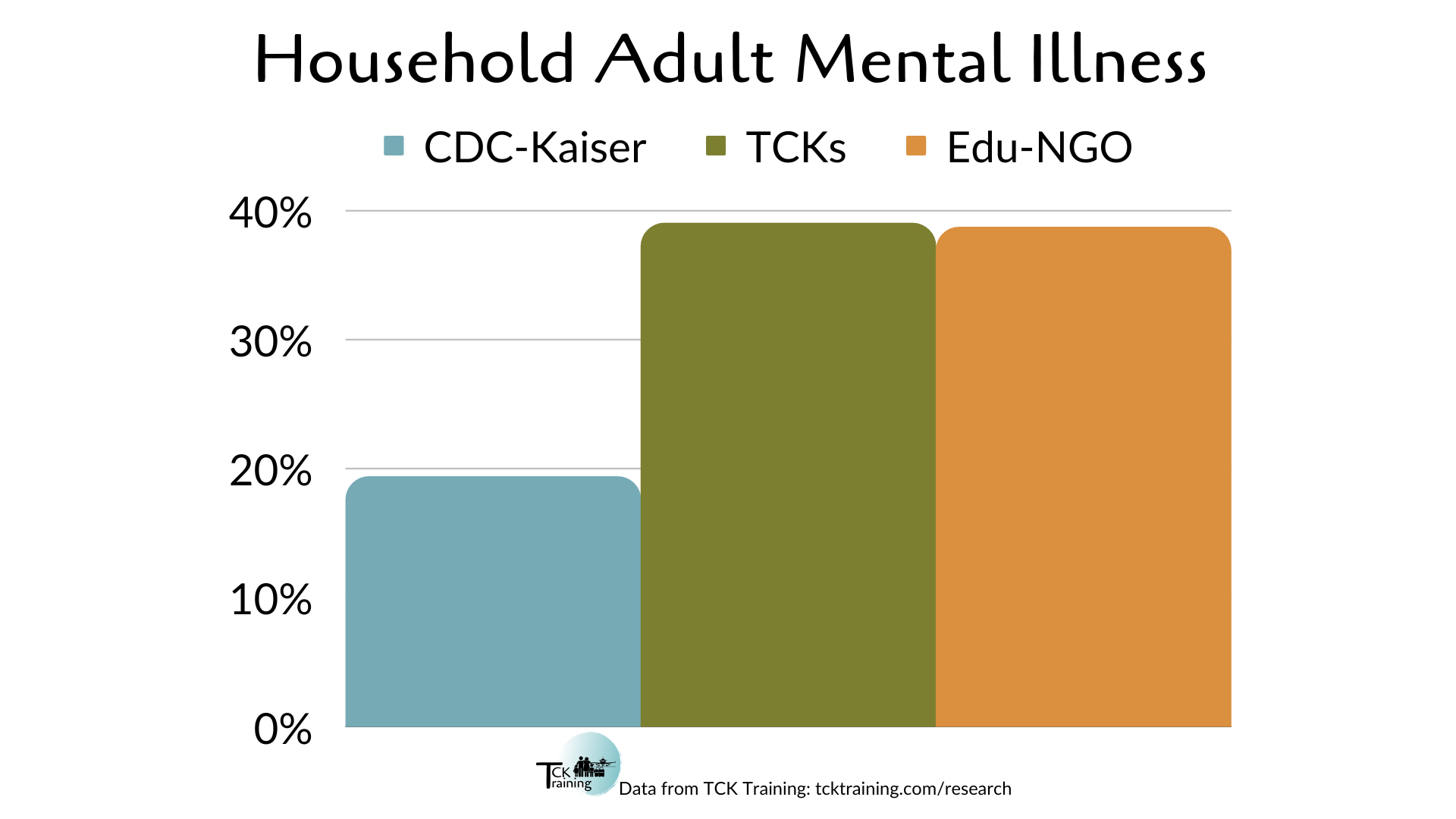
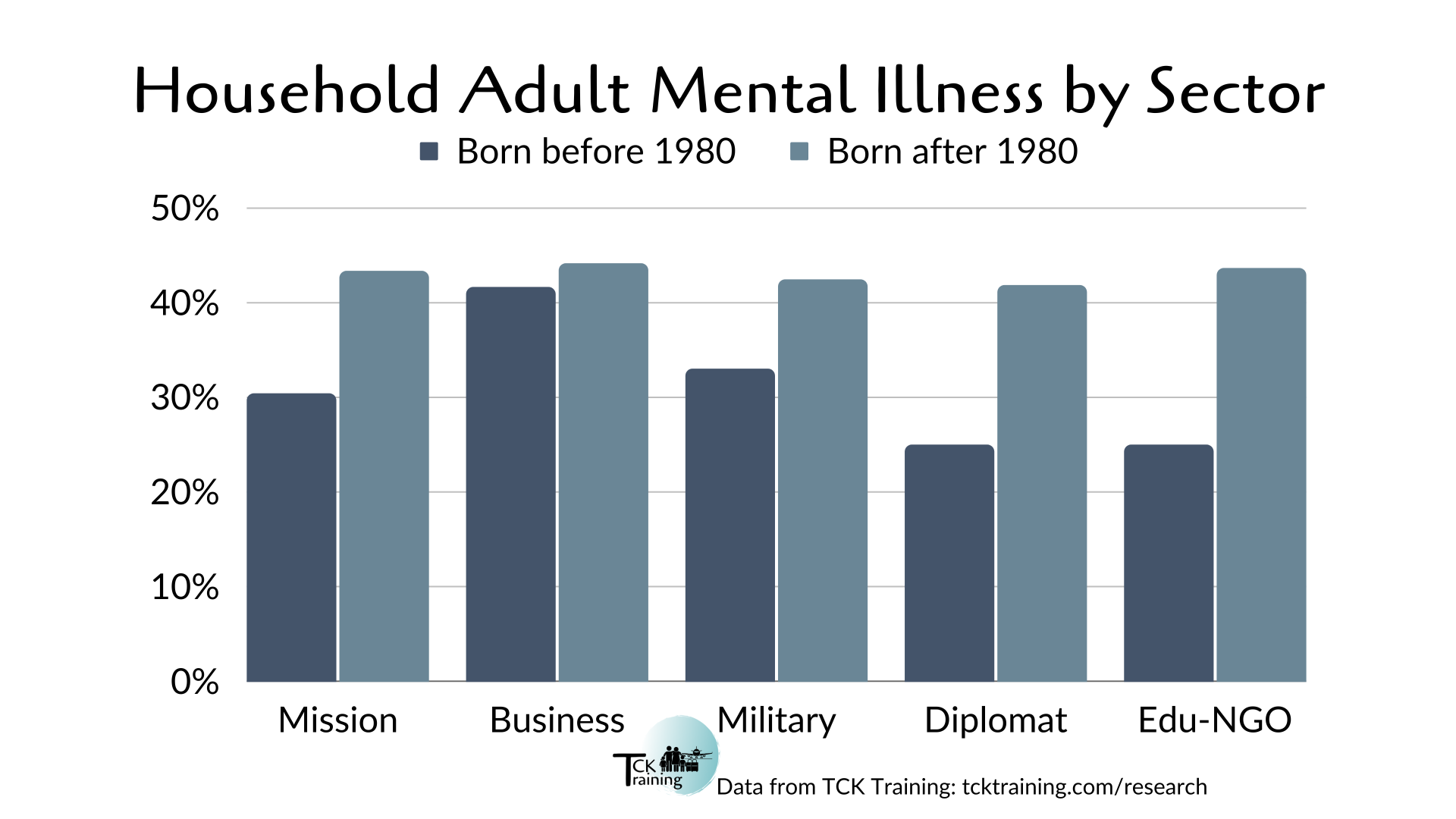
Parental Violence
Parental violence is defined as a child being impacted by, even if not actually witnessing, violence toward a mother/step-mother or father/step-father. 6% of Edu-NGO kids reported parental violence, about average with all TCKs surveyed. Unfortunately, those born before 1980 reported rates more than twice as high as the younger generation (10% vs. 4.5%).
Parental violence is defined as a child being impacted by, even if not actually witnessing, violence toward a mother/step-mother or father/step-father. 6% of Edu-NGO kids reported parental violence, about average with all TCKs surveyed. Unfortunately, those born before 1980 reported rates more than twice as high as the younger generation (10% vs. 4.5%).
It is vital that everyone who cares for TCKs be educated on what domestic abuse is, how to recognize it, and how to support families and children when domestic abuse is present.
While the rate of parental violence has dropped among the families of international educators and humanitarian workers, it is still important to be aware of this possibility. The support these families need can be challenging to find while living abroad, but it is vital to extend services to those in crisis.
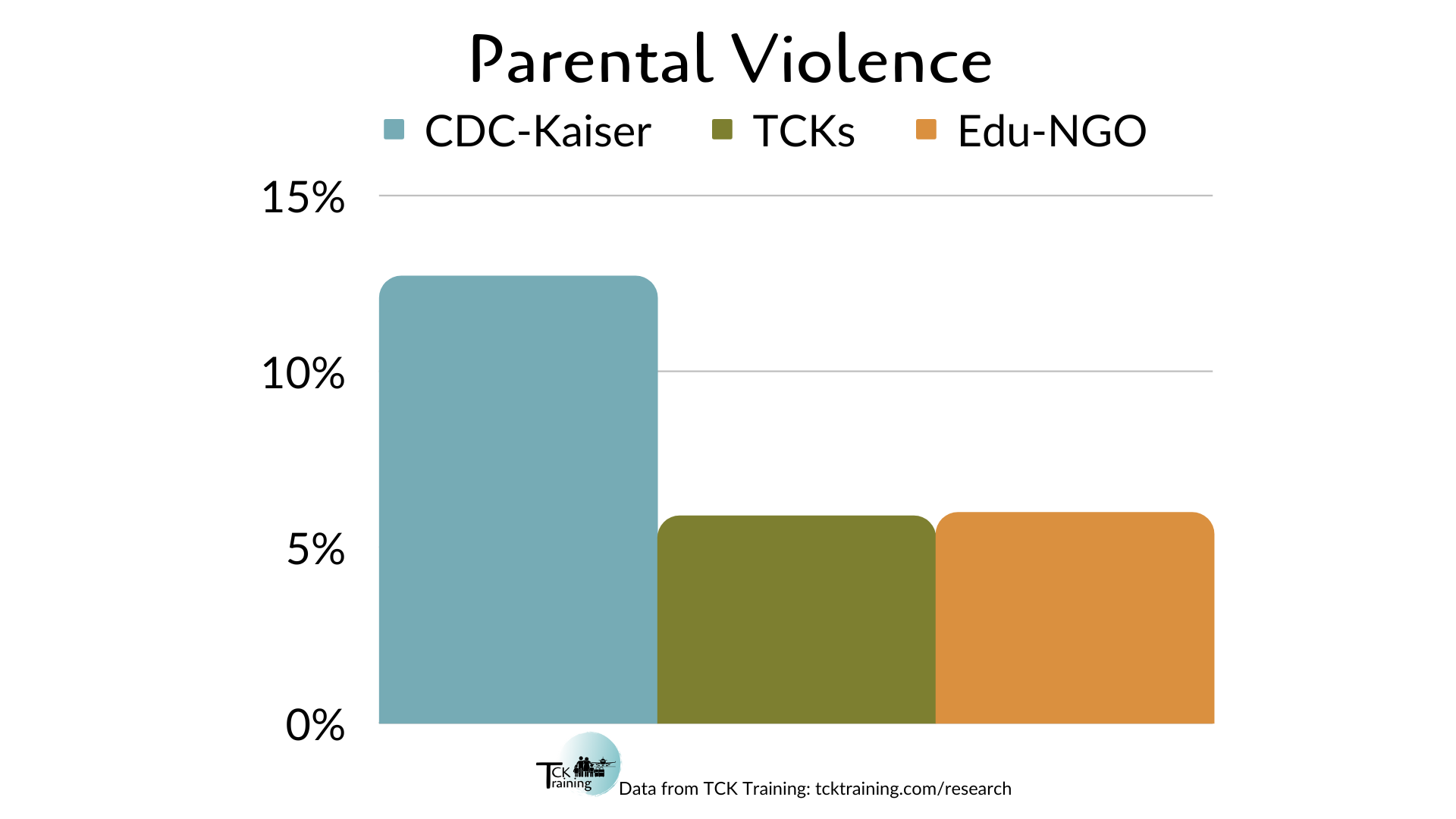
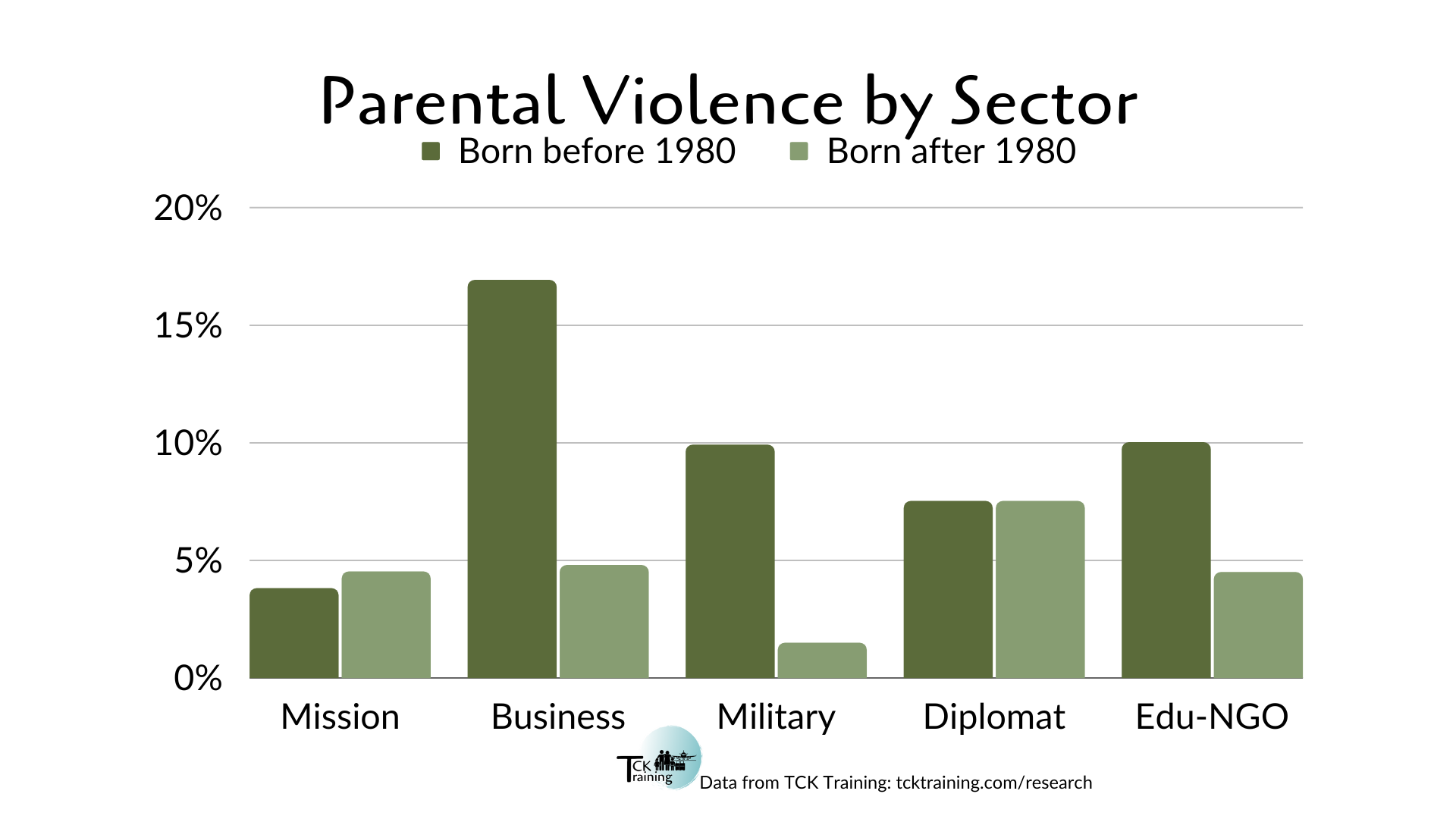
Divorce/Separation
While parental divorce/separation was 23% in the CDC-Kaiser study, it was much lower among TCKs (7%). All sectors saw a decrease in the divorce rate over time. Overall, 9% of Edu-NGO kids reported parental divorce or separation in our survey. There was a slight decrease over time, from 10% to 8%.
While parental divorce/separation was 23% in the CDC-Kaiser study, it was much lower among TCKs (7%). All sectors saw a decrease in the divorce rate over time. Overall, 9% of Edu-NGO kids reported parental divorce or separation in our survey. There was a slight decrease over time, from 10% to 8%.
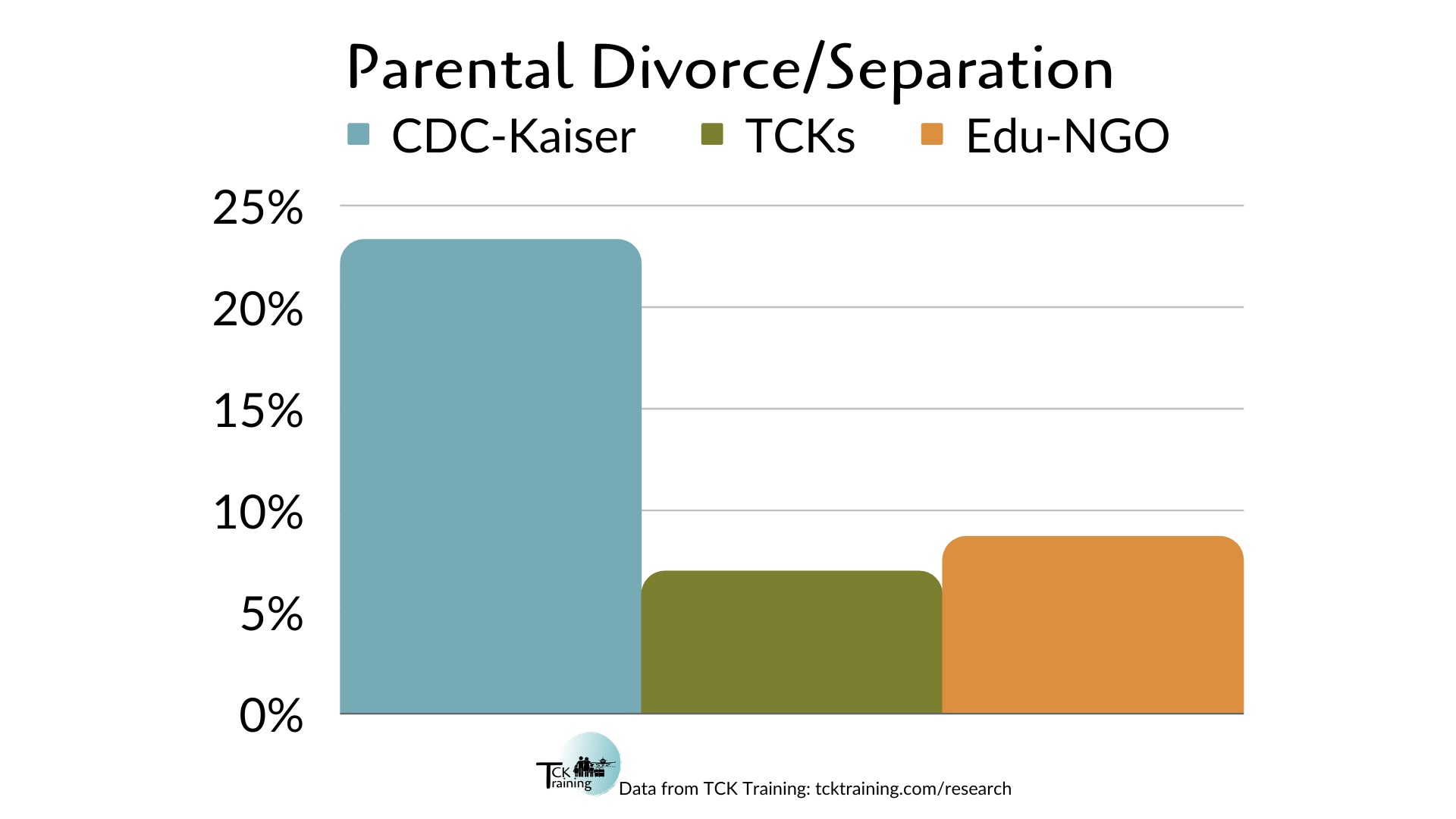
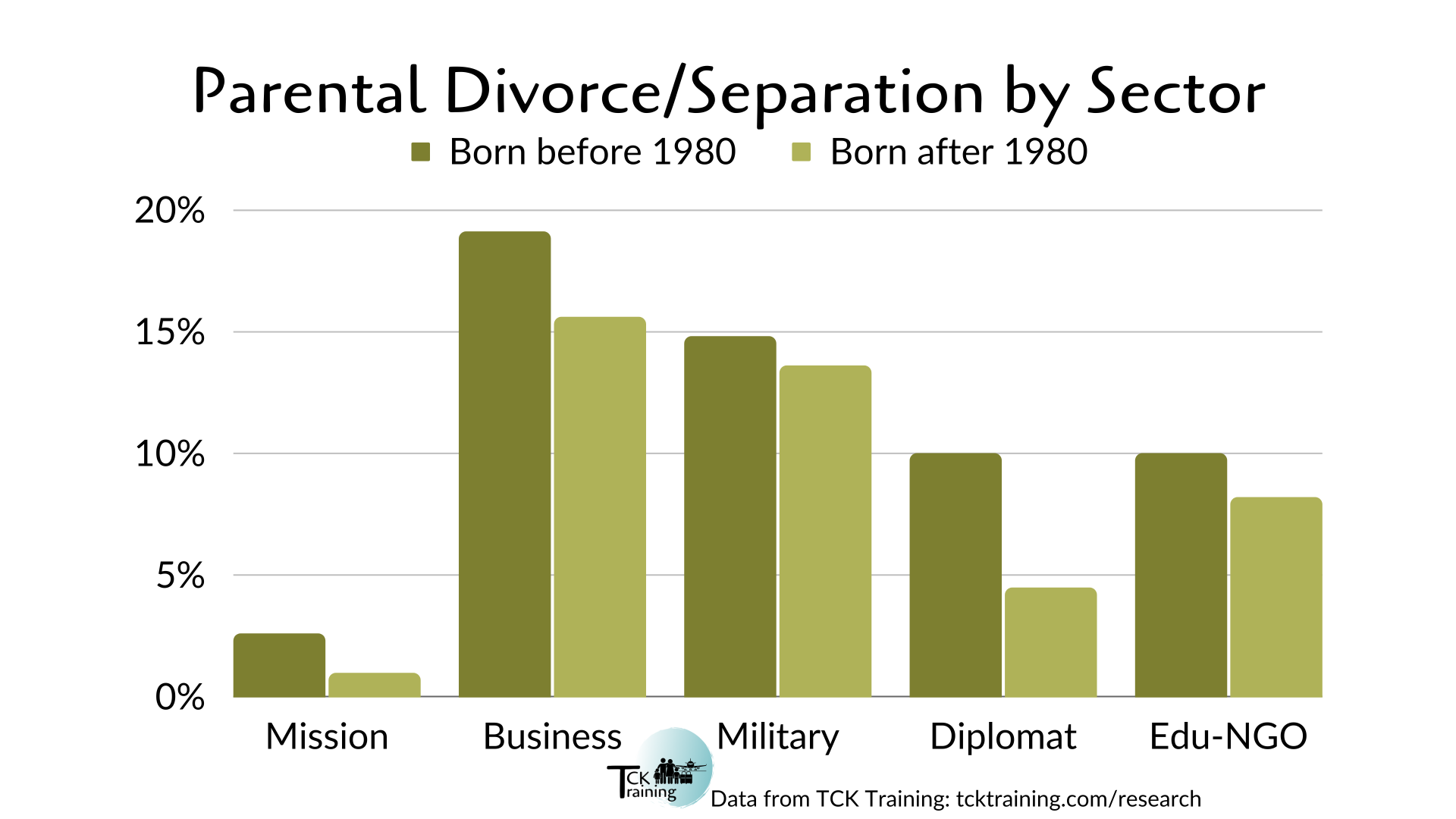
Substance Abuse
Substance abuse as an ACE factor required that an adult living in the home was an alcoholic or used illicit drugs. Edu-NGO kids reported household adult substance abuse at twice the rate as TCKs overall (20% vs 10%, similar to other non-missionary sectors). Although trends regarding household adult substance abuse among Edu-NGO kids appear similar to most of the other non-mission sectors, there is a less significant drop over time. Substance abuse can be another sign of families under stress, in need of care and support.
Substance abuse as an ACE factor required that an adult living in the home was an alcoholic or used illicit drugs. Edu-NGO kids reported household adult substance abuse at twice the rate as TCKs overall (20% vs 10%, similar to other non-missionary sectors). Although trends regarding household adult substance abuse among Edu-NGO kids appear similar to most of the other non-mission sectors, there is a less significant drop over time. Substance abuse can be another sign of families under stress, in need of care and support.
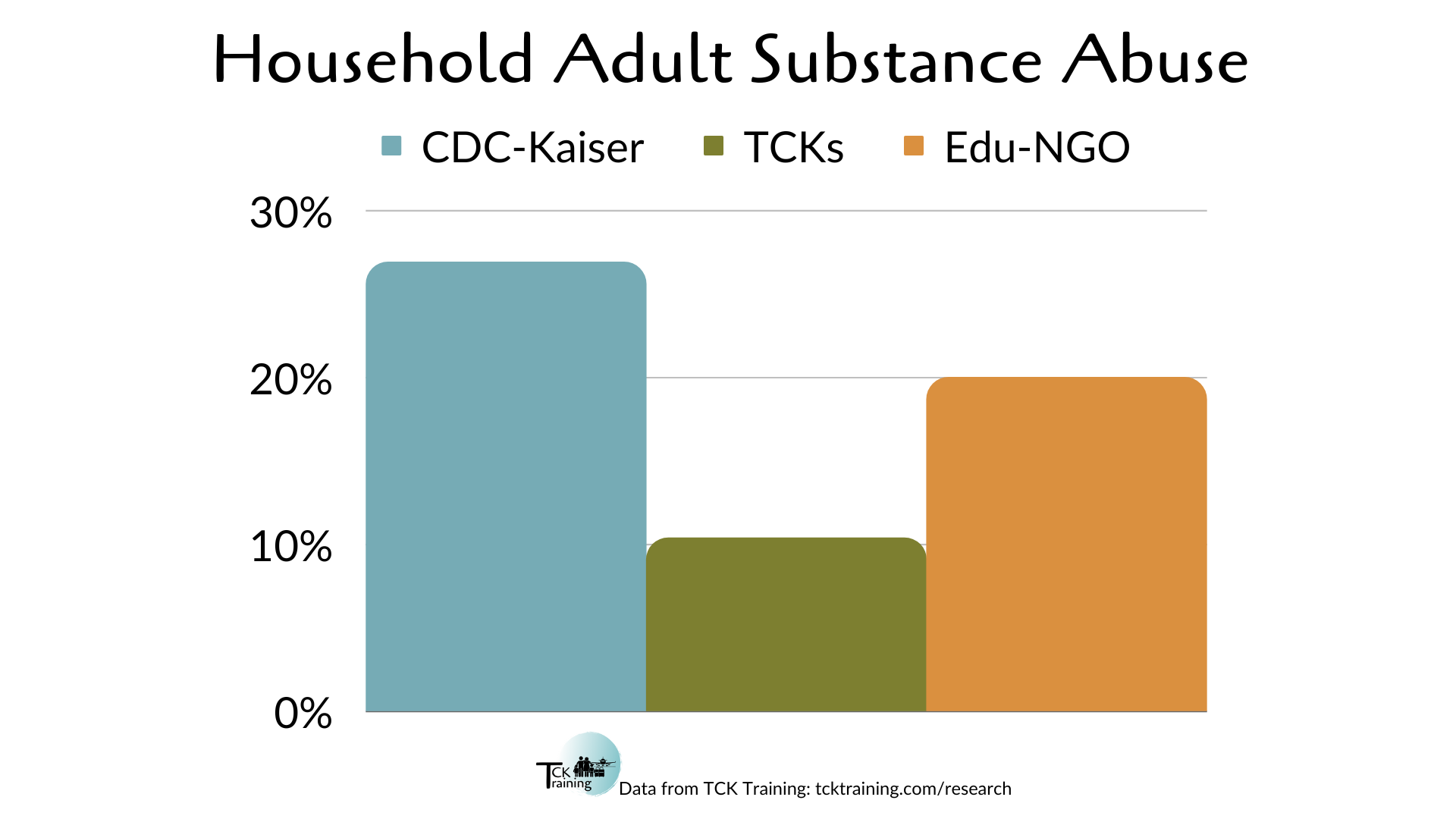
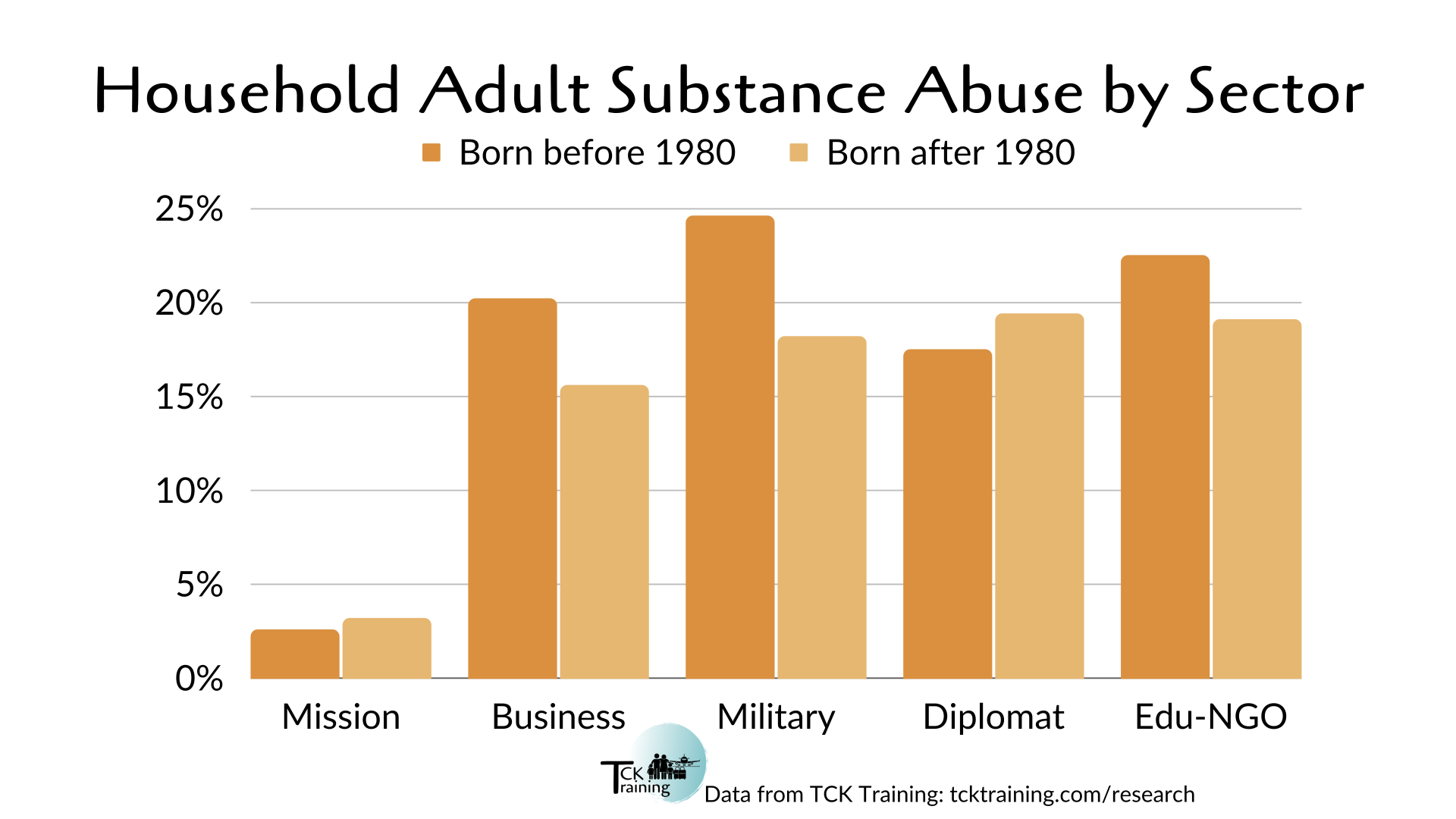
Risk Mitigation
While this data may seem pretty heavy to sit with, there is hope with ways to mitigate these risks. Globally mobile families need support in order to meet their children’s needs and ultimately thrive. These risks and challenges are neither reasons to despair or unsolvable, but rather reasons to take action in intentional ways that reflect the urgency of the matter.
While this data may seem pretty heavy to sit with, there is hope with ways to mitigate these risks. Globally mobile families need support in order to meet their children’s needs and ultimately thrive. These risks and challenges are neither reasons to despair or unsolvable, but rather reasons to take action in intentional ways that reflect the urgency of the matter.
Simple intentionality in parenting, policies, and procedures can mitigate the risk and increase the chances of positive, healthy outcomes for Third Culture Kids.
In TCKs at Risk we outline a number of ways that organizations can protect children and support families. For example, additional research into Positive Childhood Experiences (PCEs) gives a roadmap for effectively buffering children from difficulties they face.
When a person had four or more Adverse Childhood Experiences, also having at least six of these Positive Childhood Experiences lowered the risk for depression in adulthood by 72%.
With 19% of Edu-NGO kids reporting 4 or more ACEs, these buffering protections are particularly important. (Source: Caution and Hope for Children of International Educators and Humanitarian Workers).
Child protection is essential, and organization-level strategies should be put in place to safeguard children. Families need education to understand not only the rewards but also the risks for international life. When a school, higher education institution or humanitarian organization sends them abroad, that school, institution or humanitarian organization also bears responsibility for providing adequate information and effective support. Volunteer family organizations can be wonderful, but they also need institutional backing to provide the best care possible.
Child protection is essential, and organization-level strategies should be put in place to safeguard children. Families need education to understand not only the rewards but also the risks for international life. When a school, higher education institution or humanitarian organization sends them abroad, that school, institution or humanitarian organization also bears responsibility for providing adequate information and effective support. Volunteer family organizations can be wonderful, but they also need institutional backing to provide the best care possible.
When international schools, and even local schools, invite teachers to work outside their passport countries, they are also inviting risk into the lives of these teachers’ families. When humanitarian organizations, including NGOs, IGOs, and governmental charities, send their employees to live and work abroad, they put their employees’ children at higher risk. Therefore it is the responsibility of these sending and inviting organizations to implement protective measures, and provide education and training to their staff to help them do the same at home.
Protective factors such as Positive Childhood Experiences, healthy parent-child relationships, and healthy parental mental health are all tangible aspects of intentionality. Each protective factor will assist in mitigating the risk of Adverse Childhood Experiences taking their toll on Edu-NGO children long term.
Whether you work in education (as an international educator or school administrator) or in humanitarian services (in an international charity, NGO, IGO – on the field or in a home office), TCK Training is here to help! We offer a range of training and support, both organization-wide and for individual families. For example, you can learn about Preventing TCK Neglect as an Organization, Sexual Abuse Awareness Training, or applying our research in context. Parents seeking direct support can benefit from workshops such as Understanding Emotional Abuse and Neglect as a Parent, Risk Prevention for Highly Mobile Families, and Raising Healthy TCKs. And we have a whole range of services specifically for international schools!
Whether you work in education (as an international educator or school administrator) or in humanitarian services (in an international charity, NGO, IGO – on the field or in a home office), TCK Training is here to help! We offer a range of training and support, both organization-wide and for individual families. For example, you can learn about Preventing TCK Neglect as an Organization, Sexual Abuse Awareness Training, or applying our research in context. Parents seeking direct support can benefit from workshops such as Understanding Emotional Abuse and Neglect as a Parent, Risk Prevention for Highly Mobile Families, and Raising Healthy TCKs. And we have a whole range of services specifically for international schools!
References:
- Caution and Hope: The Prevalence of Adverse Childhood Experiences in Globally Mobile Third Culture Kids (Crossman and Wells, 2022. TCK Training.)
- TCKs at Risk: Risk Factors and Risk Mitigation for Globally Mobile Families (Crossman, Wells and Vahey Smith, 2022. TCK Training.)
- Caution and Hope for Children of International Educators and Humanitarian workers (Blog post, Crossman. TCK Training, 2022.)
Empty space, drag to resize
Related blog posts:
Caution and Hope for Children of International Educators and Humanitarian Workers
Other blog posts in this series:
Caution and Hope for Children of International Educators and Humanitarian Workers
Other blog posts in this series:
- Mitigating Risk Factors for Diplomat Kids
- Mitigating Risk Factors for International Business Kids
- Mitigating Risk Factors for Military Kids
- Mitigating Risk Factors for Mission Kids
- Mitigating Risk Factors for International School Students
- Mitigating Risk Factors for Homeschooled TCKs
- Mitigating Risk Factors for Christian International School Students
About the Authors
Tanya Crossman grew up in Australia and the US before moving to China at age 21; she has worked with TCKs for 20 years. She is the Director of Research and International Education at TCK Training.
Lauren is an adult TCK who grew up in East Africa and has spent nearly 10 years working with TCKs in the U.S. Her experiences have fueled her passion for supporting TCKs through preventative care that fosters healthy, thriving adults. She holds a Master’s in Public Health.



